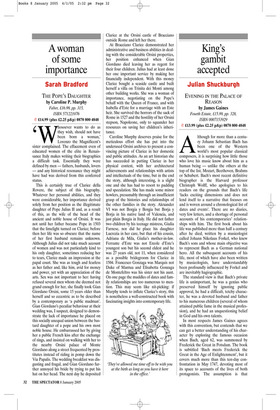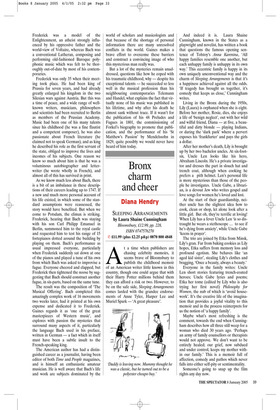King’s gambit accepted
Julian Shuckburgh
EVENING IN THE PALACE OF REASON by James Gaines Fourth Estate, £15.99, pp. 328, ISBN 0007153929 ✆ £13.99 (plus £2.25 p&p) 0870 800 4848 Although for more than a century Johann Sebastian Bach has been one of the Western world’s most popular classical composers, it is surprising how little those who love his music know about him as a human being — unlike the others at the top of the list, Mozart, Beethoven, Brahms or Schubert. Bach’s most recent definitive biographer is the Harvard professor Christoph Wolff, who apologises to his readers on the grounds that Bach’s life ‘lacks exciting dimensions and does not lend itself to a narrative that focuses on and is woven around a chronological list of dates and events’. There are no diaries, very few letters, and a shortage of personal accounts of his contemporaries’ relationships with him. The first book about his life was published more than half a century after he died, written by a musicologist called Johann Nikolaus Forkel, who knew Bach’s sons and whose main objective was to represent Bach as a German national hero. All the subsequent accounts of his life, most of which have also been written by musicologists, have understandably been profoundly influenced by Forkel and are inevitably hagiographic.
The standard view is that Bach’s private life is unimportant, he was a genius who preserved himself by ignoring public approval, he had a difficult, tetchy character, he was a devoted husband and father to his numerous children (several of whom attained public fame in the musical profession), and he had an unquestioning belief in God and his own talents.
In most respects James Gaines agrees with this convention, but contends that we can get a better understanding of his character by exploring the famous occasion when Bach, aged 62, was summoned by Frederick the Great in Potsdam. The book is subtitled ‘Bach meets Frederick the Great in the Age of Enlightenment’, but it covers much more than this ten-day confrontation in May 1747, devoting most of its space to accounts of the lives of both protagonists. The assumption is that Frederick was a model of the Enlightenment, an atheist strongly influenced by his oppressive father and the world-view of Voltaire, whereas Bach was a conventional Lutheran, composing and performing old-fashioned Baroque polyphonic music which was felt to be thoroughly out-of-date by most of his contemporaries.
Frederick was only 35 when their meeting took place. He had been king of Prussia for seven years, and had already greatly enlarged his kingdom in the two Silesian wars against Austria. But this was a time of peace, and a wide range of wellknown writers, musicians, philosophers and scientists had been recruited to Berlin as members of the Prussian Academy. Music had been one of his many talents since his childhood (he was a fine flautist and a competent composer), he was also passionate about French literature (he claimed not to speak German), and as king he described his role as the first servant of the state, obliged to improve the lives and incomes of his subjects. One reason we know so much about him is that he was a voluminous autobiographer and letterwriter (he wrote wholly in French), and almost all of this has survived in print.
As we know much less about Bach, there is a bit of an imbalance in these descriptions of their careers leading up to 1747. If a new and much more personal account of his life existed, in which some of the standard assumptions were reassessed, the story would have benefited. But when we come to Potsdam, the climax is striking. Frederick, hearing that Bach was staying with his son Carl Philipp Emanuel in Berlin, summoned him to the royal castle and requested him to test his range of 15 fortepianos dotted around the building by playing on them. Bach’s performance as usual impressed everyone, particularly when Frederick suddenly sat down at one of the pianos and played a tune of his own from which Bach was asked to improvise a fugue. Everyone cheered and clapped, but Frederick then tightened the noose by suggesting that Bach should construct another fugue, in six-parts, based on the same tune.
The result was the composition of ‘The Musical Offering’. Bach completed this amazingly complex work of 16 movements two weeks later, had it printed at his own expense and dedicated it to Frederick. Gaines regards it as ‘one of the great masterpieces of Western music’, and explores with passion the mysteries that surround many aspects of it, particularly the language Bach used in his preface, written in German — a fact which in itself must have been a subtle insult to the French-speaking king.
The American author has had a distinguished career as a journalist, having been editor of both Time and People magazines, and is himself an enthusiastic amateur musician. He is well aware that Bach’s life and work are subjects dominated by the world of scholars and musicologists and that because of the shortage of personal information there are many unresolved conflicts in the world. Gaines makes a brave effort to overcome these barriers and construct a convincing image of who this mysterious man really was.
But a lot of the mysteries remain unaddressed, questions like how he coped with his traumatic childhood, why — despite his exceptional talents — he succeeded so less well in the musical profession than his neighbouring contemporaries Telemann and Handel, what explains the fact that virtually none of his music was published in his lifetime, and why after his death he almost sank without trace. If it wasn’t for the publication of his 48 Preludes and Fugues in 1801, the commissioning of Forkel’s biography to promote that publication, and the performance of his ‘St Matthew’s Passion’ by Mendelssohn in 1829, quite possibly we would never have heard of him today.











































 Previous page
Previous page